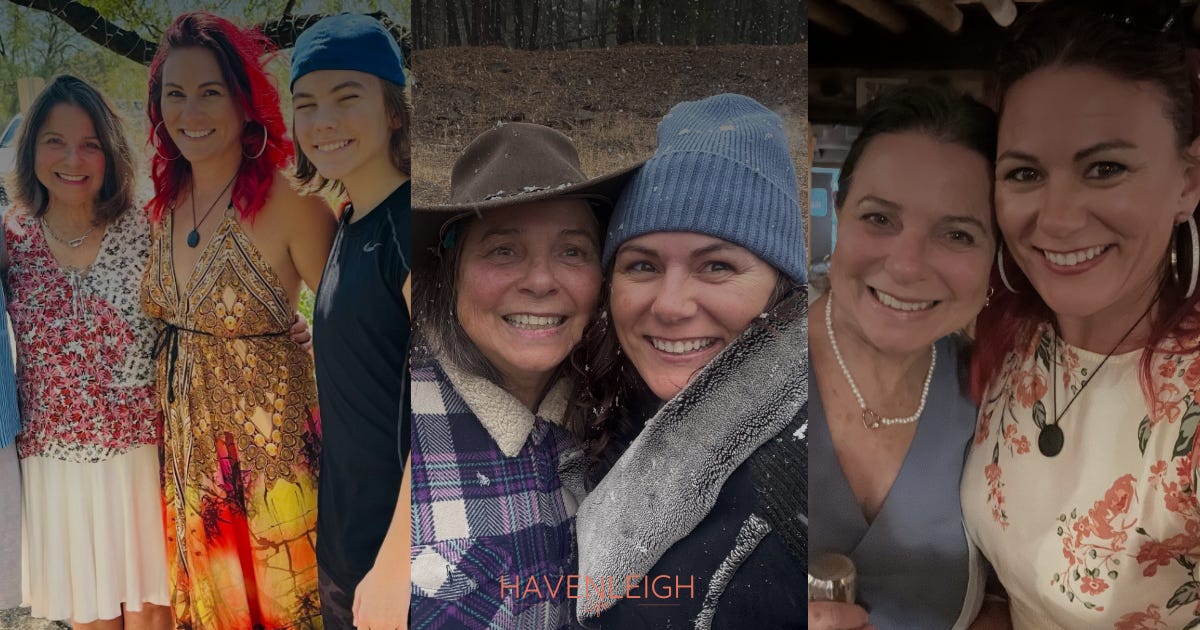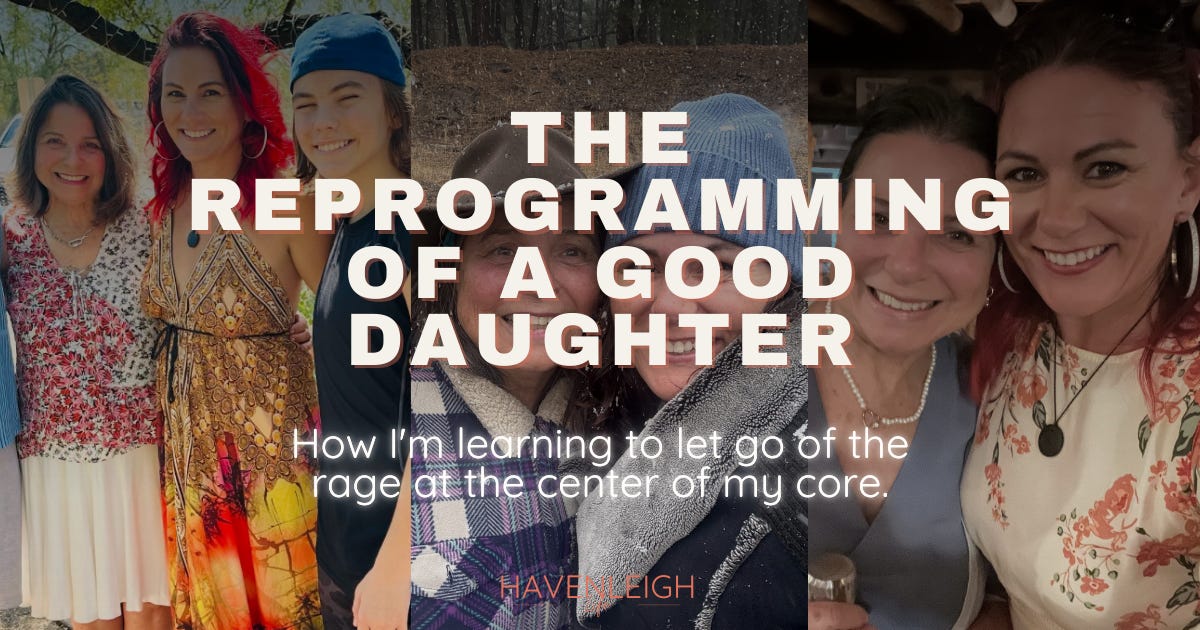The Reprogramming of a Good Daughter
How I'm learning to let go of the rage at the center of my core.
I feel like yesterday’s post was a takedown. And maybe it was. But now that I had the opportunity to do so, I’m ready for the next steps. The autopsy.
I’m not here to prove my mother wrong or point fingers. I’m here to understand why my body keeps reacting like she’s the weather and I’m the siren. I love her… fiercely. And yet, around her, I can be unkind in ways that make me so severely ashamed. That’s the part I need to name: the guilt. Where it came from. What it’s still doing to me. How I’m going to rewire it without rewriting her into a villain.
She gave me so much. She kept showing up when life should have broken her. She didn’t have the tools I have now; she has been in survival mode longer than I’ve been alive. She deserves compassion and patience. I hate when I can’t be the one to give her those things.
So I’m tracing the circuitry.
My Original Programming (That She Coded)
Safety = agreement. As a child, my nervous system learned that pleasing my mother kept the energy undisturbed. Undisturbed felt like love.
Editing = virtue. “Approved” stories, “proper” behavior, the right tone. I learned to pre-edit my words to prevent rupture.
Debt = devotion. When she rescued me (and she did, again and again), my body filed it under “You owe her… be small, be grateful, be good.”
Performance = connection. Be funny, be light, be entertaining. Feelings are private. Don’t “cause trouble” with the truth.
That code worked for decades to some degree, but a part of me has always fought it. It got tiring. So I distanced myself from her.
How the Guilt Keeps Me Stuck
Boundary guilt. Saying no feels like betrayal. My body reads my own needs as disloyalty to the woman who sacrificed so much for me.
Gratitude guilt. If she gave so much, who am I to say I feel hurt by her? Gratitude becomes a gag.
Dependency guilt. I depended on her longer than I wanted to. Every step toward independence still twitches with “I owe her too much.”
Expression guilt. When I speak honestly, the old program fires: you’re making a mess; fix your face; be agreeable; disappear.
This is why kindness can collapse into sharpness around her. It’s not cruelty; it’s a system overload. My nervous system drags me back to an outdated timeline that does not match my highest good. That mismatch lights the fuse. Rage is just the pressure valve.
Proof It’s In the Small Things (Shopping, for example)
I hate shopping. That sounds trivial until you trace the wire. For years and years, there wasn’t money. I became grateful for hand-me-downs of any kind. As a single mom, I took the bags she brought… kind gifts that also reinforced the lesson: other people choose; I adapt.
Now I can choose for myself, and a clothing store feels like a cliff’s edge. My daughters, unburdened, coax me back to ground, one piece of clothing at a time.
Rewiring doesn’t always look profound. Sometimes it’s trying on jeans without an apology lodged in your throat.
What Changes When I Tell the Truth
Here is where I am finding my truth: I’m not angry at her; I’m angry at the program that turns love into obedience, gratitude into silence, and boundaries into betrayal. I’m angry that my default response around her is still to shrink or spike… neither of which looks like love.
But naming the algorithm gives me a lever…
How I Plan To Move Forward
Before I see her: feet on the floor, hand on heart, long exhales. I tell my body, “We’re safe.”
I don’t dump the ocean. I offer one clean sentence: “I see it differently,” or “I’m getting overwhelmed; I need a minute.”
I’m allowed to pause, to step outside, to end a call. Space prevents the snap.
If I get sharp, I will repair without erasing myself: “I don’t like how I said that. Here’s what I meant.”
Post-care: Walk, cry, shake, pray, write. Discharge the charge so I don’t carry it to the next room.
None of this erases what she gave. None of it cancels my love. It just refuses the old deal where love costs me my voice.
What I Owe Her (and What I Don’t)
I owe her gratitude, dignity, and the truth delivered as gently as I can manage.
I don’t owe her my silence.
I don’t owe her the performance of a daughter who doesn’t exist anymore.
I can hold both: a real, living love for a woman who kept going without the tools I’ve had to dig for… and a real, living refusal to keep reenacting a script that harms us both.
The Hope
I understand now that my body isn’t betraying me around her… it’s remembering. That gives me a map. If I can see the trigger, I can meet it differently. If I can slow the flood by a breath, I can choose compassion and a boundary. If I can name the old code out loud, I can write a new line underneath it:
I can love my mother… without abandoning myself.
I can be kind… without going quiet.
I can be grateful… without being small.
I won’t move ahead until I learn to face my biggest trigger and use my voice anyway. But I can feel the shift… small, stubborn, real. The little girl who adored her is still here. So is the woman who refuses to disappear.
Both of us deserve compassion.
Both of us deserve patience.
And this time, I’m the one who can give it.





how refreshing, Audra, to read an acute explanation of your relationship with your mom, both good and bad, but in a way that is balanced and understanding . . . i'm about done listening to pampered actresses bitch about their parents in dramatic diatribes and without acknowledging the sacrifices their parents made on their behalf, or, as you have done, recognize that she didn't have all the tools at the disposal of modern parents and that the financial (and other) struggles of that earlier generation were in many ways more extreme than our own. Good work!
This piece reminds me that deep down, I already carry the answers I seek.
The challenge is to be still and quiet long enough to hear my own wisdom. Reading this, I feel seen–and I want to pause to honor the courage it takes to share such raw truth with others. That kind of honesty is a gift. Thank you. 😊